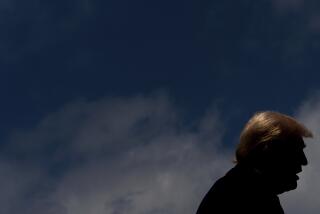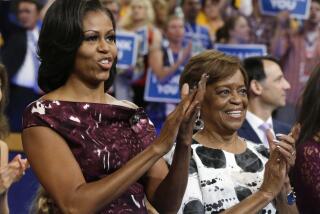Obama name is magic in Kenya Kenyan Obamas in the spotlight
NYANGOMA-KOGELO, KENYA — For about 400 people in western Kenya who can call the next U.S. president “part of the family,” the business of being an Obama has a whole new meaning.
The modest family compound here has been inundated by hordes of visitors, varying from reporters and local politicians to ordinary Kenyans looking for help in getting U.S. visas, scholarships, jobs or cash. Family matriarch Sarah Onyango, step-grandmother of President-elect Barack Obama, is treated like a rock star wherever she goes.
The Kenyan government, which once ostracized Obama’s father, is falling over itself to attend to the family. There’s a new road, 24-hour police security and an electricity line -- the first in the village. It was installed hours after the U.S. election results were announced, bypassing neighbors who have been waiting years for a connection.
“Dealing with all this,” Said Obama, the president-elect’s uncle, said with a sigh, “it’s been like a full-time job.”
In U.S. politics, presidential relatives are always something of a wild card, often the subject of curiosity or controversy. But the Obamas of Kenya promise to be a first family like none America has seen.
Here in sleepy Nyangoma-Kogelo, the Obamas are widely admired as the richest family in a town of about 2,000, successful farmers who have always helped neighbors in need, and flirted with the political elite when Obama’s Harvard-educated father rose to a prominent government post.
But though they’re at the top of the social ladder at home, the international spotlight has cast the family in an unfamiliar role -- as poor relations who suddenly appear to have hit it big. Overnight, they’ve gone from Kennedys to Clampetts.
It’s true that by U.S. standards many of the family members are relatively poor, living in mud-brick homes with no running water or, until recently, electricity. A few have tried to cash in on Obama’s success by selling their stories.
One of Obama’s half-brothers, who lives in a Nairobi slum, was thrust into the campaign after international news reports said he was homeless, living on $1 a month. (His story was used in Republican ads attacking Obama’s “family values,” but the brother later insisted that he had been misquoted. Obama’s campaign dismissed the issue without commenting.)
The family’s beloved, wise-cracking “Granny” wears colorful head scarves and slaughters chickens in the backyard. The 86-year-old Onyango is likely to steal the show at Obama’s inauguration, where she has promised to bring homemade chapati -- a traditional Kenyan flatbread that is a favorite of the president-elect.
“Do you really think I’m going to be left behind?” she cracked when asked whether she would travel to the United States to see her step-grandson sworn in.
But as the postelection celebration fades, the Obamas of Kenya are discovering that their instant celebrity is posing challenges to their identity and unity. Most hurtful, they say, are those depictions of them as “beggars” who are expecting handouts from their now-famous relation.
“We support Barack, but we have no expectations,” said half-sister Auma Obama, who has the closest relationship with the president-elect and acts as a family spokeswoman.
“We have not lacked and don’t expect to lack in anything,” she said. “There isn’t an expectation that our lives are going to change because Barack has become president.”
Onyango, who until the recent flurry of attention still worked in the fields tending her crops, said she hoped life would return to normal. “We don’t feel that we should or ought to be treated differently,” she said.
But like it or not, their lives have changed dramatically.
After Obama’s victory was announced, crowds at the family house got so rowdy that the clan called the U.S. Embassy for help. Kenyan police promptly arrived, but began roughing up some of the invited guests.
“Let’s face it,” said security expert Fred Burton of Stratfor, an international consulting firm, “the grandmother’s life will never be the same.”
Under U.S. law, presidential spouses and underage children get Secret Service protection, but siblings, parents and other relatives are on their own, said Burton, a former Secret Service agent who guarded former President Reagan, as well as Princess Diana and Yasser Arafat on visits to the U.S.
Before Obama, no president in recent memory had so many relatives living outside the United States, he said, creating unprecedented security concerns.
Their protection now falls to Kenyan police, which despite training and funding by the United States, Britain and Israel, has a spotty record.
“This is way out of their league,” said one Western diplomat.
For example, Al Qaeda fugitive Fazul Abdullah Mohammed, who is wanted in the 1998 bombing of the U.S. Embassy in Nairobi, has been arrested at least once and released by Kenyan police officers who didn’t recognize him. He routinely moves in and out of the country.
Still, Kenyan authorities insist that they can handle the job. Police set up tents to provide 24-hour protection for the grandmother after a burglar broke into the compound in September. A permanent police station is being built 200 yards away.
“We are up to the task,” said Johnston Ipara, police commander for the Siaya district.
For the family, of course, there also have been other fringe benefits to their fame. In addition to the security and infrastructure improvements, family members are fielding various offers for jobs, partnerships and endorsement deals.
Said Obama, who struggled for more than a decade amid Kenya’s chronic unemployment to find full-time work, acknowledges that he probably owes his current job as a mechanic at a factory co-owned by the prime minister’s family to his relationship with Obama.
“The Obama name is now a powerful key to open doors,” he said. “But the family is wary. I don’t want to exploit my relationship with Barack.”
Other family members have been more assertive. Malik Obama, the eldest half-brother, has asked reporters seeking interviews to first make donations to his “Barack H. Obama Foundation,” which he said funds school uniforms and community projects.
When the election results were announced, Malik Obama held a separate news conference after being nudged out of the family’s official briefing.
“The children used to be close,” said Charles Oluoch, a cousin. “But with the election, everyone is fighting to be closest to the president.”
According to Said Obama, tensions are unavoidable.
“Our family is diverse,” he said. “Before the election we needed unity. We didn’t want to be seen as talking at cross-purposes. After the election, it doesn’t matter.”
In a 2006 interview with The Times, Obama acknowledged the expectations of his large family in Kenya, some of whom he has never met.
“Everyone in the village feels related,” he said. “Some family members are very close; others I feel less close to.”
Oluoch, who lives 100 miles away with about 200 other Obamas in a second ancestral village called Kobama, complained that the Kogelo wing was getting all the attention and investment. In Kobama, residents recently spruced up the gravestone of Obama’s great-grandfather and are preserving a mud hut “where the president once slept” as a potential tourist attraction.
He said the Obamas have a proud history of producing prosperous leaders with a knack for breaking down racial barriers.
Obama’s grandfather Hussein Onyango Obama befriended white settlers when others feared the strangers as “unclean.” After serving with the British army in Tanzania during World War I, he learned English, adopted Western dress and eventually worked as a cook in colonialists’ homes.
“At first, everyone in the village feared him, but eventually they came to admire him because he could talk to a white person,” said Alfred Obama, 76, a nephew of Onyango who lives in Kobama.
Over the years, he introduced many European customs to the village, such as eating from plates with utensils, planting trees, deep-frying food and maintaining an immaculate home.
Although Onyango was standoffish, Sarah was outgoing and down-to-earth.
“She hasn’t changed at all,” said Leocadia Ndalo, 78, a former housekeeper for Onyango’s house who lives next door. After Ndalo’s husband died, she said, Sarah lent her two acres of land so she could support herself.
Thanks to Hussein Onyango’s belief in education, Barack Obama Sr., his son by an earlier wife, became one of the first Kenyans to study in the U.S. There he met and married Obama’s mother, Stanley Ann Dunham, from Kansas; she divorced him in 1964.
Upon his return to Kenya, Obama Sr. rose through the ranks of the post-independence government as a well-respected economist whose friends included the current president and prime minister.
On trips home to his village, usually in a fancy car, Obama Sr. always brought cabbages and potatoes for every household. He found government jobs for numerous villagers.
But the family’s political rise was short-lived. By the early 1970s, the elder Obama’s tendency to criticize his superiors and a worsening alcohol problem led to a career spiral that left him dejected and broke. As a Luo, he found himself the victim of rising tribalism as Kikuyus seized control of the government.
Old friends abandoned him. In 1982, Obama ran his car off the road after a night of drinking and was killed. He was 46.
Sarah Onyango worried about the family’s future.
“She said, ‘Now that this has happened to our son, what will happen us?’ ” recalled Ndalo, the former housekeeper. “The family was very bitter about the way they were treated.”
Barack Obama’s election brought a sense of vindication, friends and family members say, particularly as government officials have made the trek down the dirt road to the Obama compound to pay their respects. President Mwai Kibaki declared a national holiday in Obama’s honor.
“The death was a great blow to the Obamas,” Oluoch, the cousin, said. “We had no one else to be proud of. But 26 years later, God gave us another one.”
--
More to Read
Sign up for Essential California
The most important California stories and recommendations in your inbox every morning.
You may occasionally receive promotional content from the Los Angeles Times.










